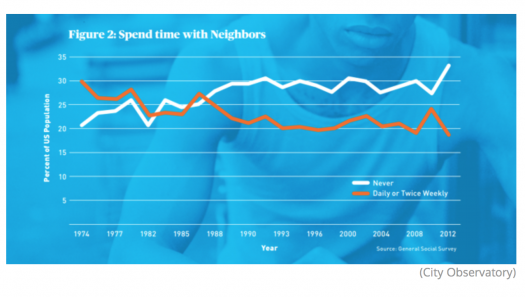A Placemaking Journal
Community Ties in the Era of Isolation
Looking back over my years of writing for Placeshakers, I notice two themes that keep surfacing: First, we’re better off taking an active role in shaping the forces of community change than we are pretending that immunity to change is a legitimate or viable option; and second, connected communities are far better positioned to weather change, mitigate negative impacts, and seize opportunity than factionalized ones. Such connections, taken collectively, form the bedrock of what we call “resilience.”
Basically, working towards something beats working against something and communities where people know, trust and rely upon one another are far more effective at getting it done.
Conceptually speaking, I continue to believe this. But another thing I’ve written often about is the fact that community is messy. It requires us to contend with people we may not agree with. People from different backgrounds or circumstance. People seemingly not like us in some way we consider important.
All of which equates to the difficulty of forging community ties and the necessity of intentional effort to make headway. And that’s something, at least according to this piece at Citylab, we’re not doing all that well. From the article:
“Few Americans today say they know their neighbors’ names, and far fewer report interacting with them on a daily basis. Pulling data from the General Social Survey, economist Joe Cortright wrote in a recent City Observatory report that only about 20 percent of Americans spent time regularly with the people living next to them. A third said they’ve never interacted with their neighbors. That’s a significant decline from four decades ago, when a third of Americans hung out with their neighbors at least twice a week, and only a quarter reported no interaction at all.”
Beyond that, a full third of Americans know none of their neighbors by name. None. Which makes it awfully difficult to organize around anything, much less proactive solutions and strategies geared towards positive transformation.
What gives?
All kinds of reasons behind our breakdown in social capital have been suggested. I maintain that much of it is fueled by the fact that we simply don’t need each other as much as we once did — at least as it relates to basic survival. We have other ways — easier, less challenging, and more entertaining ways — to spend our time now. For many of us, basic comfort and security are amenities that can be purchased, leaving relationship building with those we disagree or lack common interests with feeling like a high investment, low return proposition.
Until, that is, things go south.
Consider this graph from the Citylab article:
Notice anything interesting? Over the course of a long decline in neighborly interaction, you’ll see a couple of key spikes — times when such interaction increased. Both seem curiously aligned with dramatic economic upheaval. One surrounding Black Monday and the market crash of 1987; the other in tandem with the Great Recession. Both times when the easy acquisition of security and comfort got called into question.
In short, times when we felt just a bit more like we needed each other.
So what to do?
Global economic collapse would surely lead to dramatic increases in social capital but it’s hardly a desirable solution to the problem. Which leaves us with this: How do we meet people where they are, with all their inclinations to retreat and physically disconnect, and inspire them to get out among their neighbors — forging relationships, building trust and gaining mutual respect?
Rob Steuteville, writing for Better Cities and Towns, describes one such way — a community-run music festival called Porchfest. Rob explains:
“Porchfest is a free music event where people sign up to play on their front porches, lawns, or stoops on a given afternoon. A map is created with addresses, times, and descriptions of performers—and, viola, a community driven, volunteer music festival is born. Folks from around the area walk and ride bicycles to listen to the bands and the entire neighborhood comes alive with local culture and talent.”
Five years ago, Rob introduced me to the idea, which originated in his hometown of Ithaca, New York. I immediately recognized it as a potentially good fit for my own neighborhood and, like approximately 30 other communities around the country, vowed to launch a local version. I then promptly put it on the back burner and failed to do anything for a half decade.
But then this year rolled around and, for a variety of reasons, it just seemed right. So this October we’ll have a Porchfest of our own.
Will this prove to be an event that draws people out? That encourages them to park their preconceptions and meet their neighbors on common ground? To pursue connection, despite differences in household income or politics or even race? Will we forge ties that can be leveraged later, in good times or bad?
I don’t know. But I do know this: Given the choice between doing something and doing nothing, I’ll take the former. If even a handful of people come away feeling friendlier, better connected, or more empathetic toward others’ circumstances, it’ll be a success. And that’s a start.
–Scott Doyon
If PlaceShakers is our soapbox, our Facebook page is where we step down, grab a drink and enjoy a little conversation. Looking for a heads-up on the latest community-building news and perspective from around the web? Click through and “Like” us and we’ll keep you in the loop.










